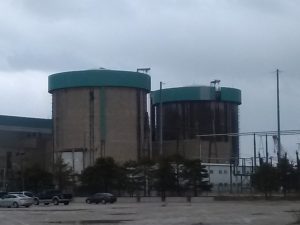Federal legislation pending to fund Zion nuke storage
Gregory Harutunian — July 26, 2016
The Zion nuclear power plant, Units 1 and 2, were permanently closed on Feb. 13, 1998 by the U. S. Nuclear Regulatory Commission. Sixty-five casks of spent fuel rods remain stored at the lakefront plant. (Photo by Gregory Harutunian/for Chronicle Media)
Proposed federal legislation aimed at gaining financial compensation for communities with shuttered nuclear power plants, and the indefinite storage of its spent nuclear fuel rods, has moved forward.
The Stranded Nuclear Waste Accountability Act, introduced July 6, targets those sites, which includes the city of Zion and a potential $15 million annual windfall for the next seven years.
House Resolution 5632, a bi-partisan bill, mandates that the Department of Energy compensate the cities hosting decommissioned nuclear plant sites in an amount equating to $15 per kilogram of spent nuclear fuel stored there, for a period of seven years. Zion’s silo bunkers house nearly 1,020 metric tons in spent fuel rods, or 2.2 million pounds.
Rep. Bob Dold, (R-10th), made the announcement at a press conference July 11, along with Zion Mayor Al Hill, whom spearheaded efforts in drawing attention to the issue including a March intergovernmental agreement between the municipality, Zion Elementary School District 6, Zion Township, the Zion Park District, the Zion-Benton Township High School District 126, and the Zion-Benton Public Library District.
“The accord expressed our concerns, all of the taxing bodies,” said Hill. “At that time, we were waiting for legislation, and they were working on the language. Dold had written and submitted the bill to the environment and energy commission. It’s currently in committee for discussions, and in a holding pattern.
“After the presidential conventions, it will get more attention in Washington, D.C., since this was a bipartisan bill. There were two republicans and two Democrats that co-sponsored it. They have decommissioned nuclear power plants within their boundaries … it’s the same situation. Spent fuel rods, and decommissioned power plants.”
The two Republican representatives, Dold and Reid Ribble of Wisconsin, joined two members from the opposite side of the aisle, Connecticut Congressman Joe Courtney and Vermont Congressman Peter Welch. The bill that was assigned to the House Energy and Commerce Committee July 6, for consideration in moving along the measure to the full House or Senate.
Its full title states: “To direct the Secretary of Energy to carry out a program to provide payments to communities in which a nuclear power plant that has ceased generating electricity and that stores spent nuclear fuel onsite is located, and for other purposes.”
The Zion plant went into operation during the early 1970s, as nuclear energy facilities were touted as a low-cost and efficient source for electrical power. Exelon Corp., the parent owner of Commonwealth Edison, built plants in Illinois. The city ceded more than 430 acres of lakefront property on the premise of job creation, and tax benefits from the site’s increased equalized assessed valuation, despite a life expectancy of not more than 25 years.
In 1982, the federal government passed the Nuclear Waste Policy Act aimed at eventual storage of spent fuel rods, and a fee of 1/10th of one cent per kilowatt hour used on customer electric bills. The total amount collected nationally was nearly $40 billion by 2014, with annual interest yields of $1.3 billion. Those amounts were broken down into calculated disbursement allotments for areas with nuclear storage sites.
However, the act was allowed to expire in 1990, and initiatives for the relocation of nuclear waste were abandoned in 2010. That same year, the transfer of Exelon’s license was approved for the Salt Lake City-based Energy Solutions. The Department of Energy had selected Yucca Mountain, Nev. as its deposit and storage site, although the plan was abandoned due to political resistance.
Units 1 and 2, of the Zion plant, were permanently shut down by the U.S. Nuclear Regulatory Commission on Feb. 13, 1998.
“There’s no place to put them … Yucca Mountain was shut down almost eight years ago, and nothing has been presented as to what is to be done,” said Hill. “Those collected funds from the utility bills were appropriated, and it was never disbursed, they have it. If they build something to store the nuclear waste, it could take up to 10 years.
“That’s the next decade. They are stored here, and ultimately, we want them out,” he said. “If there’s compensation through this pending legislation, it would mean about $15 million per year, for seven years. That amount would be divided between all the taxing districts, and that funding is tantamount to their share of the tax bill, the equalized assessed valuation. That’s important.”
The Zion Library District had attached itself to the intergovernmental agreement in order to raise awareness of the issue regarding the collected utility fees being held in abeyance and no movement in relocating the nuclear waste. Library district director Carol Dolin said the funds were set up to mitigate social and economic factors in storing the rods at the closed facility, and the inability to utilize the lakefront for the community.
As for potential security risks at the plant site, Hill had previously noted that 65 air-cooled casks of spent fuel rods are stored on the lakefront. “They have security, 24/7, but I’m not privy to their procedures. We just want them out of here.”
Requests for comment from media relations at Exelon Corp., through its Chicago headquarters, were not returned.



